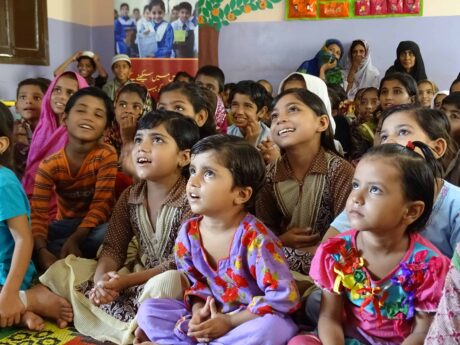Islamabad, PakistanSami Ullah always wanted to join the teaching profession, like his father, to contribute to the development of his rural village in Pakistan’s Federally Administrated Tribal Area (FATA).
When the Associate Degree in Education program opened in 2013 at the Government College for Elementary Teachers in nearby Mir Ali, he jumped at the chance to pursue his dream.
The degree program and the scholarship Ullah received were thanks to the NOUS. Agence pour le développement international à travers son Projet de lecture au Pakistan. The project worked with the Ministry of Education and Higher Education Commission to launch the new early grade reading-intensive degree at teacher training institutes across the country.
The five-year Pakistan Reading Project supports provincial and regional departments of education to improve the reading skills of 1.3 millions d'enfants en première et deuxième années. Il est mis en œuvre par le Comité international de secours et ses partenaires Associés créatifs internationaux, Apprentissage mondial et l'Institut de gestion rurale.
Despite his enthusiasm, Sami Ullah’s dreams were almost derailed mid-degree by conflict near his village as government forces campaigned against terrorist insurgents from North and South Waziristan. He temporarily put his studies on hold and fled, along with nearly 1 million other residents, to neighboring Bannu.
“I became a temporarily dislocated person, sometimes traveled to different cities, stayed under a shed and even lived under no roof at all,» se souvient-il.
While several education students in FATA abandoned their studies due to instability or economic pressures, Ullah was determined to continue on. As soon as he could, he returned to his courses, committed to earning his degree so he could help young learners in his area.
En mars 2016 at a ceremony in Peshawar, Sami Ullah graduated with an Associate Degree in Education and a record of exemplary grades. He was eager to apply his new skills and knowledge in the classroom.
“I have been fortunate to be introduced to this degree program, from which I came to truly understand the new concepts of teaching,” says Ullah, nothing that he could not have undertaken his studies without the financial support of his scholarship.
“The course has completely changed my thoughts about teaching," il a ajouté. “Where other certification courses don’t allow you to gain in-depth knowledge of this sensitive profession, this new course has allowed me to see beyond the other old-fashioned techniques of teaching.”
Dynamics of the FATA region
Sitting at Pakistan’s northwest border with Afghanistan, the FATA region has experienced terrorism and insurgency for over a decade. It has historically lagged behind the rest of the country in socioeconomic development in general and education in particular.
With fewer opportunities for education due to ongoing conflict, quality education is considered a great asset, especially in light of an insurgency of violent extremism. Educators like Sami Ullah are critical to bringing quality education, especially in early grade reading, to boys and girls across this conflict-affected region.
“Pakistan needs more well-trained teachers to ensure quality education for all. In areas like FATA that are affected by militancy with comparatively inadequate resources there is an even stronger demand for quality teachers,» dit Naeem Sohail, Chef d'équipe adjoint du projet.
Scholarship program shapes stronger future teachers
A significant component of the USAID-funded Pakistan Reading Project is to provide financial support to bright and ambitious students like Sami Ullah who want to pursue careers in teaching.
These merit-based scholarships are inclusive of women, minorities and geographically distributed to provide fair opportunities for higher education across Pakistan. En tout, the project will award 123 scholarships to students of the FATA region, y compris 112 for the two-year associate’s degree in education and 11 for the four-year bachelor’s degree in education—many of which have already been distributed.
Le two new degree programs encourage a change in teaching approach from a teacher-centered to learner-centered outlook, a cornerstone of the project’s successful early grade reading methodology.
The USAID-funded Pakistan Reading Project aims to increase enrollment in the two programs in an effort to produce better teachers for future generations. The project works closely with teacher training institutions and universities.
These new degree programs were initiated in partnership by the Higher Education Commission, which aims to meet goals set out in the 2009 Politique d'éducation nationale. The Policy states that by 2018 all teachers in Pakistan’s classrooms should have a bachelor’s or associate’s degree. The notification also states that after December 2017, no new teachers will be hired based on the old requirement of one year of teacher training.
“I am very hopeful that these young teachers will have a far-reaching impact on education in Pakistan and help to improve student learning across Pakistan for generations to come,” says Sohail.
Noman Manzoor est le responsable des communications & Responsable des rapports pour le Pakistan Reading Project/Creative.



